Astronomers have a plan for using ripples in space-time to hunt for elusive intermediate-mass black holes around the Milky Way's center.
The most elusive black holes in the universe aren't the big ones, or the small ones. They're the medium ones — and a team of astronomers has proposed a new method, using ripples in space-time, to hunt for them.
Astronomers theorize that there might be some black holes caught in between these two extremes, known as intermediate-mass black holes , with masses a few thousand times that of the sun. But there's one catch: Despite searching for them for decades, we haven't found any yet. And so a team of astronomers, writing on the preprint server arXiv.
However, other models of black hole formation suggest that IMBHs might actually be common and just difficult to detect. The cramped conditions of the galactic core, for example, might be ripe to produce potentially thousands of large-but-not-supermassive black holes. But those IMBHs might be hidden, as the supermassive black hole in the very center of the galaxy would dominate our observations.
Related stories— James Webb Telescope spots galaxies from the dawn of time that are so massive they 'shouldn't exist'—What's the biggest black hole in the universe?
Malaysia Latest News, Malaysia Headlines
Similar News:You can also read news stories similar to this one that we have collected from other news sources.
 Black Hole Brawl: Astronomers Discover Rare Quasar Pair Ready to RumbleAstronomers have discovered a rare pair of actively feeding supermassive black holes, or quasars, on the verge of colliding. This unique system, J0749+2255, was found in merged galaxies when the universe was 3 billion years old. The discovery provides insights into the emergence of supermassive blac
Black Hole Brawl: Astronomers Discover Rare Quasar Pair Ready to RumbleAstronomers have discovered a rare pair of actively feeding supermassive black holes, or quasars, on the verge of colliding. This unique system, J0749+2255, was found in merged galaxies when the universe was 3 billion years old. The discovery provides insights into the emergence of supermassive blac
Read more »
 'Green Monster' supernova is the youngest in the Milky Way, James Webb telescope revealsNew James Webb Space Telescope images reveal the grisly past of Cassiopeia A, the youngest known supernova remnant in the Milky Way.
'Green Monster' supernova is the youngest in the Milky Way, James Webb telescope revealsNew James Webb Space Telescope images reveal the grisly past of Cassiopeia A, the youngest known supernova remnant in the Milky Way.
Read more »
 Mother of Dragons: Astronomers Peer Inside the 'Dragon Cloud'How did the most massive stars form? New observations of the so-called Dragon Cloud may hold the clue to answering this mystery.
Mother of Dragons: Astronomers Peer Inside the 'Dragon Cloud'How did the most massive stars form? New observations of the so-called Dragon Cloud may hold the clue to answering this mystery.
Read more »
 Cosmic Probes: Astronomers Discover Massively Powerful Fast Radio Bursts That Skewer Nearby GalaxyAfter upgrading the radio telescope array at Westerbork, The Netherlands, astronomers have found five new Fast Radio Bursts. The telescope images, much sharper than previously possible, revealed that multiple bursts had pierced our neighboring Triangulum Galaxy. This allowed the astronomers to deter
Cosmic Probes: Astronomers Discover Massively Powerful Fast Radio Bursts That Skewer Nearby GalaxyAfter upgrading the radio telescope array at Westerbork, The Netherlands, astronomers have found five new Fast Radio Bursts. The telescope images, much sharper than previously possible, revealed that multiple bursts had pierced our neighboring Triangulum Galaxy. This allowed the astronomers to deter
Read more »
 Astronomers detect record-breaking energy bursts in Triangulum GalaxyUpgraded radio telescope array at Westerbork discovers 5 new Fast Radio Bursts piercing Triangulum Galaxy, revealing maximum number of invisible atoms.
Astronomers detect record-breaking energy bursts in Triangulum GalaxyUpgraded radio telescope array at Westerbork discovers 5 new Fast Radio Bursts piercing Triangulum Galaxy, revealing maximum number of invisible atoms.
Read more »
 First-ever close-up of a supermassive black hole sharpened to 'full resolution' by AI, and the results are stunningAstronomers have used machine learning to sharpen the 2019 Event Horizon Telescope image of the black hole M87*, the first direct image of a black hole ever taken.
First-ever close-up of a supermassive black hole sharpened to 'full resolution' by AI, and the results are stunningAstronomers have used machine learning to sharpen the 2019 Event Horizon Telescope image of the black hole M87*, the first direct image of a black hole ever taken.
Read more »
